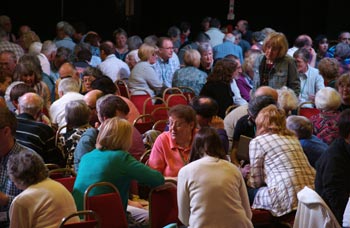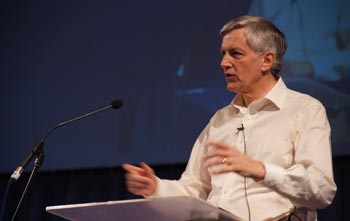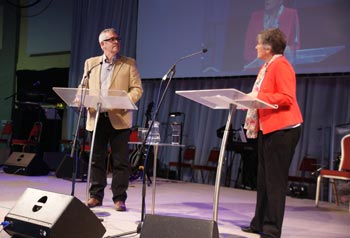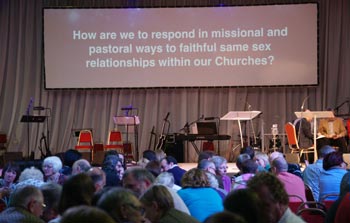There is a real sense that Baptists want to wrestle with the issue of how to respond to faithful, same sex relationships
(Baptist Assembly 2013)

That appeared to be a theme of the Monday morning plenary session at the Baptist Assembly, which began with a Bible study, heard from a minister whose son is gay and then made space for small group discussions on the subject.
The session was chaired by the Revd Ernie Whalley, the new president of the Baptist Union of Great Britain. At the end he asked: 'Do we think it is important for us to explore this in our churches over the next few months?'
The response from the floor was a resounding "yes".
It started with a Bible study conducted by the Revd Glen Marshall and the Revd Dr Anne Phillips of the Northern Baptist Learning Community.
Focusing on Isaiah 42: 1-9, Mr Marshall said the passage doesn't directly address the issue of sexuality, but offers guidance as to 'how the servant people of God are to go about their business'.
We are to respond to God's call 'in a way that isn't strident, in a way that oozes gentle tenderness, in way that is stamped by a determination and resilience,' said Mr Marshall. 'Quietly, gently insistently declaring truth, pursuing justice.'

The problem, Dr Phillips said, is that it's really hard to balance tradition and new learning for a new context as Isaiah was doing. 'What we're trying to discern together in this session is what former things have had their day, in the light of new things God declares which are also based on truths about the nature of God built into the fabric of creation.'
Assembly heard from the Revd Dr Paul Goodliff, Ministries team leader, and the Revd Stephen Keyworth, Faith and Society team leader, who set the social context. Dr Goodliff explained how there had been a dramatic reversal since 2001, when Assembly last discussed the issue. 'It no longer seems strange to be gay in our society.'
Mr Keyworth said that the Civil Partnership Act had been a 'significant' move forward. And while we believe the Good News of Jesus is for everyone, Dr Goodliff said, the gay community views the church with suspicion, as a body that 'either rejects or even hates them'. 'We must do better as we proclaim the gracious love of God to all,' added Mr Keyworth.
In a moving section, Assembly heard from the Revd Richard Lewis, a regional minister but speaking now as a husband and father. Mr Lewis shared how one of his four children, at the age of 27, told him he was gay. It set off so many questions. 'Is it our fault? Have we treated you any differently? But of course we hadn't.'

Mr Lewis shared how his son's Civil Partnership ceremony had drawn something of a line. However, questions remain. 'I'm a parent struggling to understand,' he said.
He continued, 'I asked him, "Where does the church fit?". His response, was "There's no place for people like us in the church."'
Delegates were then invited to break off into small groups and discuss the question: 'How are we to respond to missional and pastoral ways to faithful same sex relationships with our churches?'
A number of 'listeners' were on hand to record observations from the discussions, which were then fed back from the main stage when the discussion period had ended. They were told they could produce written responses, or email their response to
talkingtogether@mail.com.
The responses, shared by the listeners, included:

-
'We should be accepting first, then allow the Holy Spirit to convict'
-
'Jesus said very little about homosexuality'
-
'There is not an unanimity in our church'
-
'There are limits to acceptance'
-
'We want one thing with our hearts, but are struggling theologically'
-
'There is a sense that it's really good to be discussing it'
-
'There's a real sense that people want to love each other'
-
'Might there be a misinterpretation on this issue, as there was with women in leadership?'
-
'People want to work through it - they want more Bible studies'
-
'How do churches respond to unmarried heterosexual couples living together?'
Responding, Dr Goodliff said it seems clear that this is something 'we want to wrestle with, and not bury'. He then attempted to dispel the 'urban myth' that should a minister talk about homosexuality, they are at risk of losing their accreditation. 'You can talk about this. Council has wanted this debate to happen - so let's talk about it without risk.'
The Baptist Union of Great Britain wants to hear from churches on this issue. It will be discussing it at November's Baptist Union Council.
An email address has been set up where people can give their views:
talkingtogether@mail.com